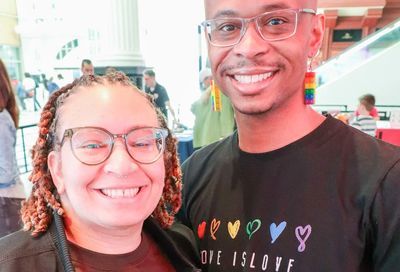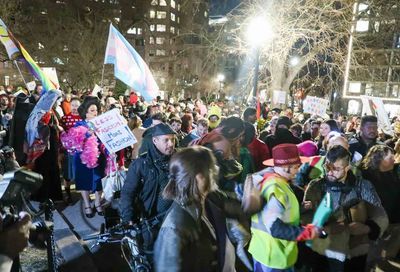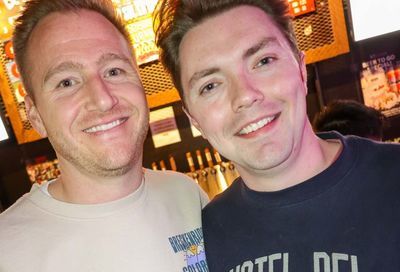South Africa Speaks Out
Reel Affirmations 2006
Review by Nancy Legato
Rating: 



 (5 out of 5)
(5 out of 5)
[Critic’s Pick!]
Saturday, 10/14/2006, 3:00 PM
Shorts presentation, $9 at Goethe Institut Inter Nationes
WE ALL KNOW South Africa for its apartheid history and its present failure to curb AIDS. However, it’s also a country with the youngest constitution in the world, a constitution that actually protects people from discrimination based on sexual orientation. That said, discrimination based on gender and sexual orientation, at the very least, remain crises of epidemic proportions for that country, major contributors to the AIDS crisis, and a burden of injustice for its female and queer citizens. Black Beulahs ( 



 ) and Rape for Who I Am (
) and Rape for Who I Am ( 



 ) are two brilliant documentaries that bring the lives of South Africa’s queer and black men and women into sharp focus for those of us on the other side of the ocean.
) are two brilliant documentaries that bring the lives of South Africa’s queer and black men and women into sharp focus for those of us on the other side of the ocean.
Fanney Tsimong created Black Beulahs to portray the lives of three men he considered role models of Soweto’s black gay male community: Lucky ”DK” Jabane, Joseph ”Chix” Matinin, and Somizi Mhlongo. With an unerring and unflinching eye, Tsimong not only highlights the strength, beauty, and pride of these men, but also explores the tensions and inconsistencies in their feelings about themselves and others around them in Soweto.
As it turns out, each has his own pockets of self-hatred and homophobia. One gets the impression of community schisms and fractures from various comments discussing ”after-niners” (men who have sex with gay men, but only after carrying on a straight lifestyle during the day), or comparing drag ”artists” with drag queens.
But what really comes through is the integrity of the community fabric that holds these men in friendship and sustains them despite whatever judgments they make about themselves and one another. Tsimong has carefully weighed and chosen each phrasing, each scene fragment, successfully conducting the voices of his subjects to a symphony. The audience is rewarded with so much that is joyful, jaded, fabulous, and frustrating in the Soweto community, as if we were a direct observer instead of peering dimly through a lens.
Rape For Who I Am is Lovinsa Kavuma’s harrowing account of the targeting of black lesbians in Soweto for rape. Through the voices of Buhle, Keba and Bathina, we learn the many forms it takes — rape by a father, gang rape by ”friends,” gang rape by strangers on the street — but all apparently for the same reason: punishment for being a lesbian.
As shocking as the individual stories are the reactions from family and community. Bathina’s mother doesn’t want to talk about Bathina’s father raping her because she’s ”bored with it.” A man says a woman was raped ”to find out if she was a man.” A doctor refuses to document a rape as such, first riddling the survivor with homophobic questions and then insisting a gang rape was actually consensual sex.
The uplifting aspects are the women’s voices themselves, true survivors in every sense of the word as they tell their stories and take action to raise the visibility of the epidemic of violence against women in their communities. — Nancy Legato
Support Metro Weekly’s Journalism
These are challenging times for news organizations. And yet it’s crucial we stay active and provide vital resources and information to both our local readers and the world. So won’t you please take a moment and consider supporting Metro Weekly with a membership? For as little as $5 a month, you can help ensure Metro Weekly magazine and MetroWeekly.com remain free, viable resources as we provide the best, most diverse, culturally-resonant LGBTQ coverage in both the D.C. region and around the world. Memberships come with exclusive perks and discounts, your own personal digital delivery of each week’s magazine (and an archive), access to our Member's Lounge when it launches this fall, and exclusive members-only items like Metro Weekly Membership Mugs and Tote Bags! Check out all our membership levels here and please join us today!


















